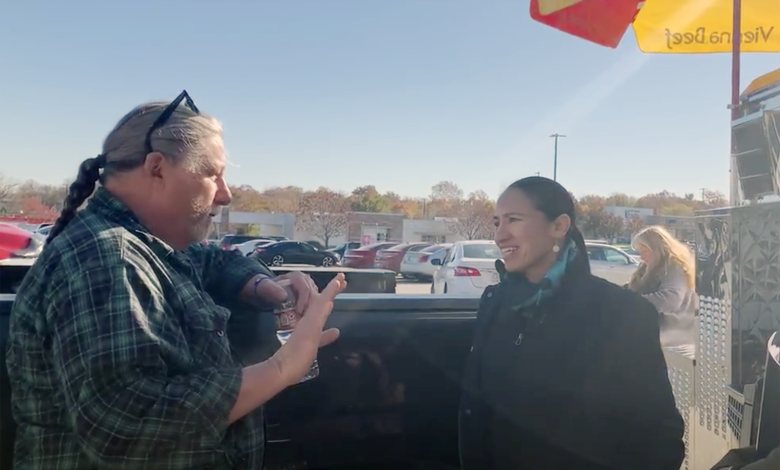KC lawmakers backing legislation to boost re-entry for veterans becoming entrepreneurs

Veterans who return to the workforce as entrepreneurs face unique challenges when exiting full-time military life, said Brian Newton. A bipartisan push by two members of Kansas City’s delegation to the U.S. House could ease the transition for veterans-turned-small business owners.
“My father was a career Marine and I served for a decade myself, with seven of those years spent overseas,” said Newton, a veteran and owner of Morty’s, a food cart and catering business specializing in Italian beef sandwiches and Vienna Beef Chicago-style hot dogs. “I struggled for many years integrating back into civilian life, and especially with starting a business since we often re-enter our new communities alone without the knowledge of how these systems work or even where to begin.”
Because of high demand and after years of searching for space, Newton recently purchased a brick-and-mortar location in Kansas City, Kansas, where he will soon open a restaurant for walk-up and delivery service.
The entrepreneur met with U.S. Rep. Sharice Davids, D-Kansas, Friday as he prepared his cart for daily operations, telling her not only about his business journey, but the difficulties family members and fellow veterans have experienced — particularly when they return from service with traumatic injuries.
Alongside U.S. Rep. Mark Alford, R-Missouri, Davids introduced the Successful Entrepreneurship for Reservists and Veterans (SERV) Act to study the barriers veterans face when starting a business and improve the accessibility of existing veteran-focused small business programs.
“As the daughter of a veteran, I have always said that because of their sense of service and dedication, there are few people better situated to become entrepreneurs than our nation’s veterans,” said Davids, who sampled a Morty’s Italian beef sandwich for an early lunch.
The SERV Act recently passed out of the U.S. House Small Business Committee unanimously and now heads for a vote on the House floor, where it passed in 2019 with broad bipartisan support. The legislation:
- Commissions a Government Accountability Office (GAO) report on the ability of veteran and reservist small business owners to access credit.
- This includes a new analysis on common sources of credit and how deployment and other military responsibilities affect veterans’ and reservists’ credit.
- Requires the U.S. Small Business Administration’s Interagency Task Force on Veterans Small Business Development to develop an action plan for outreach and promotion of the many programs available to veterans looking to transition into the business world.
- Requires the task force to report annually to Congress on its appointments and outline its plan for outreach on the many programs available to veterans, service-disabled veterans, reservists, and their spouses.
“The steps taken in the SERV Act will move us closer to sparking veteran entrepreneurship,” said Alford in July. “Congresswoman Davids and I will not stop until this legislation is signed into law.”
Newton said he was thankful for leaders like Davids working on veterans behalf.
The Kansas congresswoman also recently helped pass the Honoring our PACT Act, which expands Department of Veterans Affairs’ (VA) health care eligibility to 3.5 million American veterans exposed to burn pits and toxic airborne hazards while deployed.
Davids’ meeting Friday with Newton was among several recent appearances meant to highlight her entrepreneur- and business-focused efforts in Washington, D.C.
In late October, Davids’ met with workers at a Roeland Park Price Chopper for one of her “Sharice’s Shift” community visits, helping store employees unload deliveries from shipping trucks, stock grocery shelves, and bag groceries.
Davids also reintroduced the bipartisan 21st Century Entrepreneurship Act to increase workforce and entrepreneurship opportunities, especially for students from underserved communities. She has served on the U.S. House Small Business Committee since being sworn into Congress in 2019.
“In Kansas, we have the talent and the great education system to power the next generation of entrepreneurs — and we know from experience that mentorship improves outcomes for students,” said Davids. “The 21st Century Entrepreneurship Act will provide effective after-school programs with new curriculum and experienced mentors, creating a pipeline of success for our students.”
While most existing federal entrepreneurial development and mentorship programs focus on those with already-established careers, Davids office said, this bill would help create a pipeline to entrepreneurship by targeting entrepreneurial education toward students from underprivileged and underrepresented backgrounds.
If passed, the bill would take advantage of the SCORE program — a resource partner of the U.S. Small Business Administration — broadening its mission to deploy existing expertise to young entrepreneurs.
The successful legislation would direct the SBA to create an entrepreneurship curriculum for SCORE volunteers to implement at community learning centers (CLCs). CLCs are federally-funded after school programs that usually help enrich underserved students.
Click here for a list of CLCs funded in Kansas.






